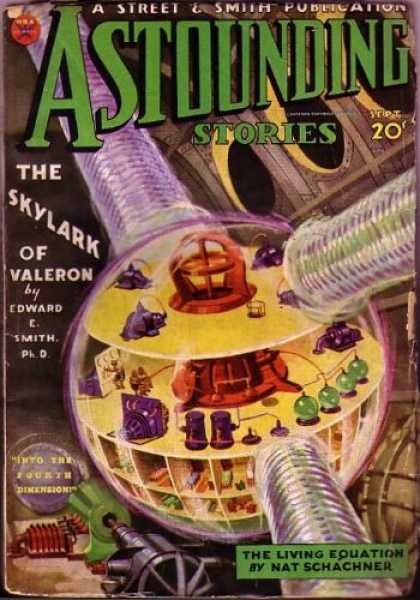|
LITR 4632: Literature of the Future |
Sample Student Final Exams 2011
|
 |
Haylie Unger
The Human Touch in the Future
Ever wondered what will happen to human interaction in the future when the world is dominated by computer technology—Twitter, Facebook, texting, and Xbox Live? What comparisons or contrasts can be made between the social relationships of a technologically advanced future and one in which humans might choose another, not so high-tech and virtual, path? Or is the thought of choosing any other future but one rich in technology just wishful thinking, the imagination creating a Utopian ideal where it can never exist? Obviously, the conditions of the future are based upon the choices of the past. If one chooses path A, then he will arrive at one location, a vastly different location than if he had chosen path B. Because the choices we make today will affect our tomorrows, reading future literature can be very helpful. Literature of the future offers vicarious learning experiences through which an individual or society might explore the possibilities of the future and determine his best route. So, what does literature of the future suggest about the conditions of social interaction in either a high-tech or low-tech reality?
In “Burning Chrome,” the reader enters a technologically advanced world set in the future. It’s a world occupying that liminal space between reality and virtuality. In the opening scenes, the reader might struggle to determine what is reality— in fact—, and what is not. However, it soon becomes apparent that Bobby, Jack, and Rikki spend a great deal of their time in the world of artificial intelligence. Observation of the interaction between these three characters quickly reveals cold and distant relationships. Bobby Quine uses Rikki more as a muse than as an object of true affection. At one point, when Jack asks Bobby where Rikki is, he replies that she’s at friends with a mere shrug. In comparison, readers later see Bobby laughing and crying as he takes down the artificial world of Chrome online. This cold and uncompassionate future is one often seen in the world of virtual reality.
In another techie future scenario, “The Logical Legend of Heliopause and Cyberfiddle,” a similar relationship is described. When Heliopause shares his idea of building a fiddle with his cyber friends, they disregard the plan coolly, logging off with not so much as a “good day to you.” Later, Heliopauses’s interaction in the outside world with the Bummer is touching and readers begins to develop a true interest in this character left all alone in the outside, but Bummer meets a cold and unemotional end when he attempts to follow Heliopause through the door and in incinerated by lasers. The incident suggests that the computers within the secure realm of Heliopause’s dwelling are not even programmed to recognize the presences of a human, thus the human as a human is irrelevant. He only matters in relation to the virtual world he often inhabits. Consequently, the virtual reality distances itself further ands further from sincere human interaction.
“The Onion and I” and “Johnny Mnemonic” show similar examples of cool human interaction. In “Onion,” Father and son flee that cold, insincere world of virtuality to garden together in the real world, where we witness them bonding, both emotionally and physically. In “Johnny,” all the characteristic elements of the world of cyberpunk are visible: the characters are street-style outlaws with implants and extensions (canine teeth, dolphin bodies). Johnny himself appears part computer since he carries within him the memories of other people (like a computer). Once again, the interactions between Johnny and his peers, who are never distinctly human but somewhat so, are cool, distant, unemotional.
These examples of virtual reality and the high-tech world of our possible future suggest neither warmth nor closeness developing between humans beings. Is there possibly a better alternative for the future? Can not another path be chosen? Utopian and Ecotopian literature suggests just this. In “Chocco,” a world is described where neither conversation nor human bonding is lost. The ordeal to choose a new memory keeper shows constant and respectful engagement between members of the tribe. Similar relationships are presented in the future/past story “House of Bones,” where the clan places more importance on compassion than on mental/technological advances. Ecotopia perhaps illustrates the possibility of a warm and communal future better than any other of our readings. In this community, citizens participate not only in open conversations with each other but support each other in times of need. Even the post-apocalyptic world seen in “Parable” shows a closeness of humanity not witnessed in the high-tech worlds of virtual reality.
This steady progression (regression?) from a warm, human world to a cold, distant one simultaneous with the advent of technology seems all too believable. Guys spend 16 hours a day and die of dehydration because they are so involved in an online game. People casually end a texting conversation without so much as a “have a good day,” leaving the other participant in the conversation wondering where the person went. Jackie Baker, in a final titled “From Techie Innovator to Average Joe,” notes this very trend, stating “we cannot expect to experience the technological world without experiencing the side effects.” Jackie also suggests that with “advancement always comes regression.” Consequently, as one future draws nearer to a world based in virtual reality, it distances itself from the warm and sincere interaction of the human being.
So, future literature will allow us to make our own informed choices today regarding what we expect the future to look like. Do we want a high-tech, virtual reality where human bonding is limited and interactions are cold and unemotional? Or will we choose to create a low-tech, environmentally concerned future for ourselves and our posterity? For me, it’s Ecotopia all the way!
